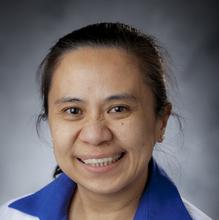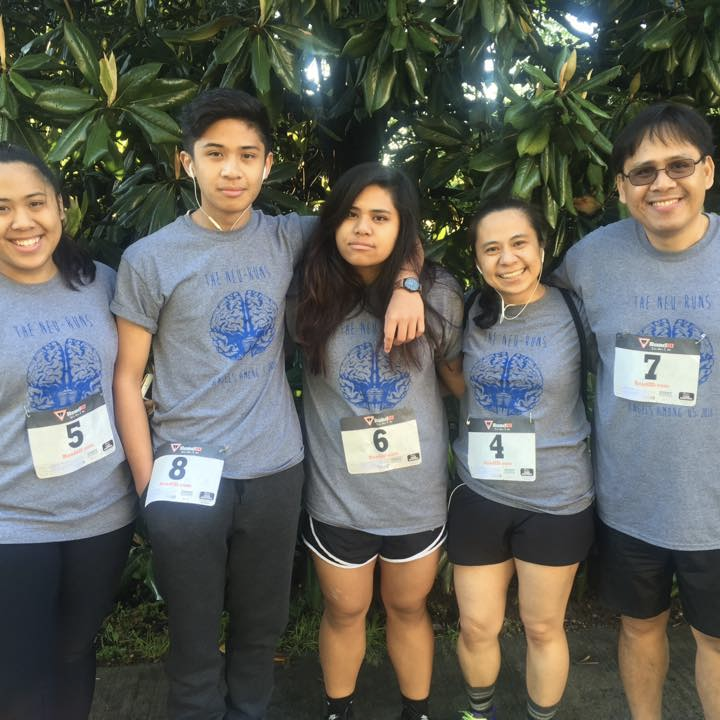
Irene Abella, APRN, NP-C, never thought she would leave her first love, public health, for neurology. Fortunately for our Department, her initial stay in our neuro intensive care unit (or Neuro ICU) in 2008 infected her with a love of the field, and she has stayed with us ever since. In this week’s “Spotlight” interview, Abella talks to us about her nursing experience in the Philippines and Saudi Arabia, her current work treating (and listening to) patients with sleep disorders, and how Duke has changed in the 12 years since she arrived.
What are your responsibilities within the Neurology Department? What does a typical day for you look like?
In 2008, when I joined the Department, I was seeing patients who had stroke post hospital discharge 50% of my time and I started helping the Sleep and Epilepsy Division following up patients with sleep disorders the other 50% of the time. After a year and a half doing both, I switched to seeing patients in sleep medicine full time.
How did you get interested in treating patients with neurological conditions? What do you enjoy most about that work?
I never thought I would fall in love with neurology. My first love is public health. My first job as a nurse was as a grass-roots community health organizer in the Philippines. I had some general ICU experience when I worked as a nurse in Saudi Arabia so when I moved to the U.S., I was hired in our neuro ICU. Having worked with the wonderful Duke Neuro ICU team who are passionate about neurology "infected" me to love taking care of patients with neurological problems.
What was your time in the ICU in Saudi Arabia like? How do the health system and patient needs in that country compare to those in the U.S.?
I worked just for a year in a northern province of Saudi Arabia. It was in 1423 (Arabic calendar), or 2002 in the Gregorian calendar. It was a short experience but I have seen that their health care system to be more efficient compared to the U.S. It is government run (I worked under the Ministry of Health) so it is free. The referral system also appeared more effective versus the U.S. They are up to date in technology.
They have a very diverse workforce (Asian, European, and African mostly). Given limitations in communication (since most of us do not have English as our first language), the care provided is at par in excellence compared to the U.S. Just imagine a code run by an Egyptian doctor working with Indian and Filipino nurses. Although there is obvious inequality (our paycheck is based on the color of our passport), I have seen how there can be unity in diversity. When we care of a patient, we had a common goal and the color of our skin was immaterial in achieving that goal.
Morbidities are the same. In terms of mortality however, I have rarely seen unnecessary prolongation of life. People are fatalistic so health, morbidity and mortality are all considered as Allah's will.
What’s been the biggest change at Duke since you came here in 2008?
It has grown so much that I cannot keep up with how many new locations and new buildings it has. I remember the train that used to connect Duke North to Duke South. Despite the change in the physical structure however, the Duke atmosphere of caring for patients with excellence and passion has never waned.
In your Duke Health profile video, you talk about building partnerships with patients to help them decide how to move forward. Can you tell me more about that process? How does this kind of partnership help improve patient care?
I see many patients with sleep apnea. Getting a CPAP is not "sexy." If I can allay my patients' anxiety about wearing a mask and using the machine because they know I am working with them closely in the process, they are more successful in adhering to the therapy. Example: I have patients who send me a message to adjust their CPAP setting 7 to 9 nights in a row. It is okay, I consider it "fine tuning." Patients then realize that we do our best to help them, the close follow up/partnership makes them less frustrated and they eventually get used to the therapy.
You also talk about helping patients to build healthy behaviors, a notoriously difficult area to change. What are some ways you’ve learned to help people change their behavior for the better?
Listening. I do my best to listen and not just hear what patients have to say. Capturing what concerns them when they express themselves helps me identify the specific issue or problem to address. I cannot address a problem that they do not perceive as one.
What passions or hobbies do you have outside of the Department?
I love to travel and not just see the "sights"; but "live" with the people. I love to read novels, biographies, autobiographies but mostly listen to audiobooks now that my vision is not as good as it used to. I like thrillers and espionage. My favorite authors are Stephen King and Tom Clancy.

In this photo, Abella poses with her fellow "Neu-run" teammates in the Angels Among Us walk fundraiser for the Duke Cancer Institute.